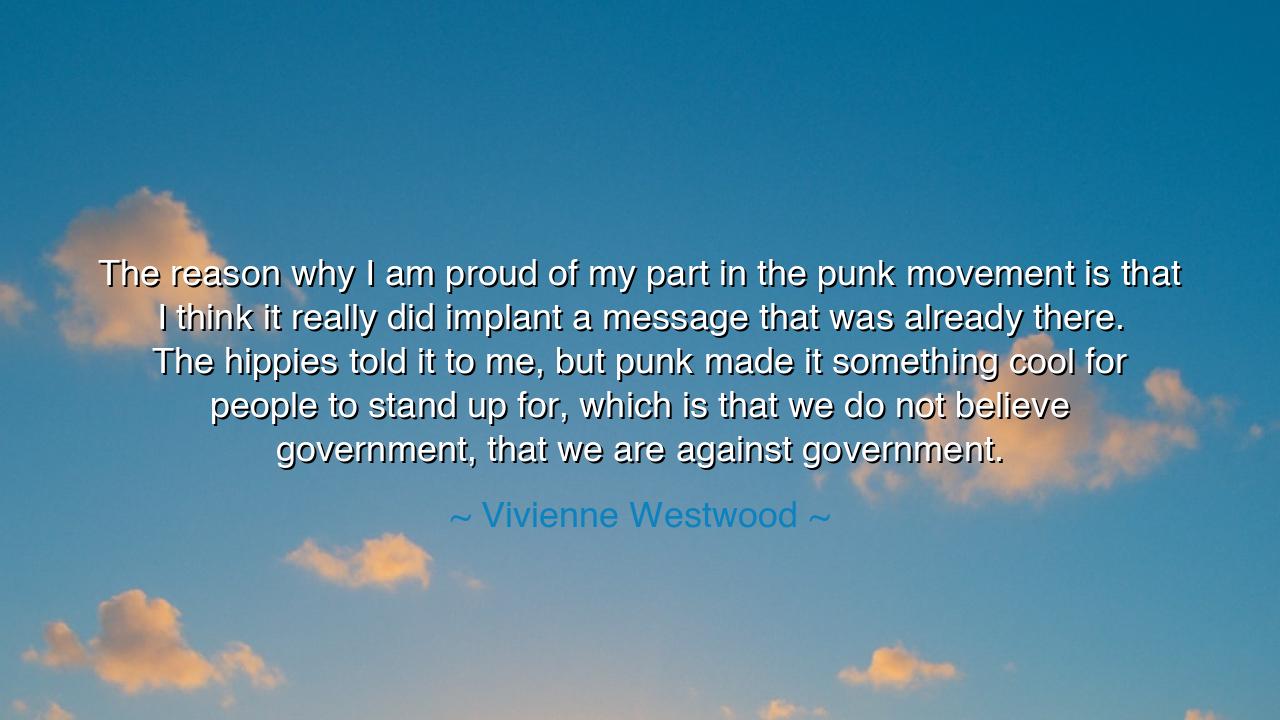
The reason why I am proud of my part in the punk movement is that
The reason why I am proud of my part in the punk movement is that I think it really did implant a message that was already there. The hippies told it to me, but punk made it something cool for people to stand up for, which is that we do not believe government, that we are against government.






In the turbulent ebb and flow of human history, there are moments when new movements rise, challenging the status quo and igniting the spirit of rebellion in the hearts of the people. Vivienne Westwood’s words, "The reason why I am proud of my part in the punk movement is that I think it really did implant a message that was already there. The hippies told it to me, but punk made it something cool for people to stand up for, which is that we do not believe in government, that we are against government," encapsulate a profound truth about the power of cultural movements to reshape the very fabric of society. She reflects on the role of punk in giving a voice to the discontent and anger that had been simmering beneath the surface for years, and in making the rebellious spirit something to be celebrated rather than feared.
In the ancient world, the idea of rebellion against authority and government was not a new concept. From the Greek city-states to the Roman Republic, the tension between rulers and the ruled was often a central theme in the unfolding drama of history. Socrates, for example, though a revered philosopher, challenged the established norms of Athenian society. His famous trial and execution were a direct result of his refusal to accept the limitations imposed by the Athenian government. Socrates' message was not one of rejection for the sake of chaos, but rather a call for introspection and truth. In the same spirit, punk did not simply oppose authority for its own sake but sought to question the structures that limited human freedom, expression, and individuality. Westwood’s reflection on punk echoes this ancient desire for change—to stand up against forces that suppress the true nature of the individual.
The hippie movement, which preceded punk, also carried with it a deep rebellion against established norms, particularly against the war-driven, consumer-driven society of the 1960s. The hippies preached messages of peace, freedom, and love, but their ideals often struggled to find broad acceptance in mainstream culture. Their rejection of government and the established order was in many ways a precursor to the punk movement, but it lacked the edge and defiance that punk would later bring. The punk movement, with its raw energy, irreverence, and DIY ethos, made the rejection of authority something more than just a philosophical stance—it became a bold, fashionable statement. Westwood, as a fashion designer, played a pivotal role in shaping this new aesthetic, where rebellion was not only an intellectual pursuit but a visual language that people could wear with pride.
The lessons of ancient rebellion and defiance are not merely historical curiosities—they continue to inspire the present and future. Consider the example of Cicero, the great Roman statesman and philosopher, who boldly opposed the rise of dictatorial power in Rome. His speeches against Cataline, who sought to overthrow the Roman Republic, are not just political manifestos; they are declarations of freedom, calls to arms for the people to preserve their rights against the encroachment of tyranny. In a similar vein, punk provided a voice for those who felt marginalized, oppressed, or silenced by the structures of their society. Like Cicero, punk was a cry for justice, a call to reject the status quo, and to stand up for something greater—freedom and individuality.
In today’s world, the spirit of punk and rebellion continues to resonate in the hearts of those who refuse to accept the complacency and conformity that many governments seek to impose. The messages of punk, much like those of Socrates, Cicero, or the hippies, are not simply about opposition—they are about the affirmation of something better. They are about standing up for the rights of the individual, for the freedom to question and to create, and for the dismantling of systems that stifle growth and creativity. Westwood’s pride in being part of this movement reflects a broader truth: true progress comes not from conformity, but from the courage to question, to stand up, and to challenge the powers that be.
The lesson of Westwood’s words is clear: the act of rebellion is not about destruction, but about construction—constructing a new world built on principles of freedom, individuality, and expression. The punk movement, though sometimes seen as a moment of youthful anger, was also a powerful catalyst for change. It asked hard questions about the role of government, the place of the individual in society, and the right to live freely without fear of repression. It is a reminder that in every age, the powerful must be held accountable, and the voices of the marginalized must be heard.
Let us then, in our own lives, embrace the lessons of the past. Like the ancient rebels before us, we must question what is unjust, and refuse to accept the limitations placed on our freedom. Whether in our art, ideas, or actions, let us honor the spirit of rebellion not as an end, but as a beginning—the beginning of a better, more just world. Let us never shy away from standing up, even when it feels uncomfortable, because it is in these moments of resistance that true change is born.






AAdministratorAdministrator
Welcome, honored guests. Please leave a comment, we will respond soon